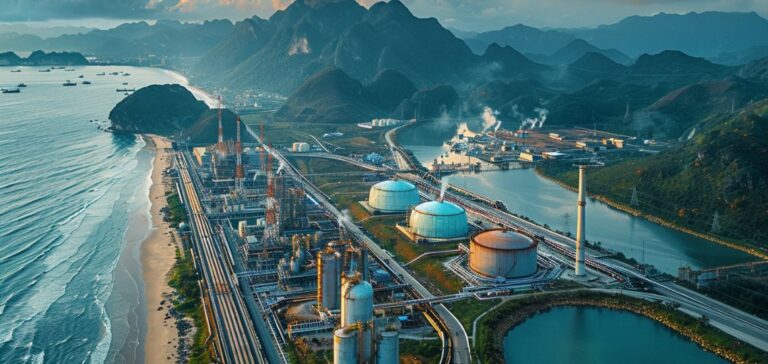Vietnamese and American companies recently formalized several commercial agreements worth a total of $4.15 billion. These contracts mainly involve energy supply, oil and gas exploration, and petrochemical imports. According to official statements, the implementation of these projects is expected to create several hundred thousand jobs across both countries. This initiative occurs in a context where the U.S. trade deficit with Vietnam remains substantial, ranking just behind those recorded with China and Mexico.
Precise nature of the agreements
The agreements cover several strategic areas, including Vietnam’s importation of liquefied natural gas (LNG) and petrochemical products from the United States. Companies involved include PetroVietnam Power (PVPower), Vietnam Gas Corporation, and ConocoPhillips. According to communicated estimates, the commercial exchanges resulting from these agreements could cumulatively reach a value of $36 billion over time. These projects were confirmed following a meeting in Washington between Nguyen Hong Dien, Vietnam’s Minister of Industry and Trade, and Jamieson Greer, the U.S. Trade Representative.
In this context, Vietnamese authorities have announced a reduction in import duties applicable to American goods. This measure primarily concerns liquefied natural gas, agricultural products, and high-tech equipment. The stated objective is to increase bilateral trade while gradually reducing the existing trade imbalance in Vietnam’s favor.
Trade context and tariff tensions
These new measures come amid rising concerns in Hanoi regarding possible tariff actions the United States might take to reduce its trade deficit with Vietnam. This deficit is currently among the highest recorded by Washington, following those with China and Mexico. Fear of potential American economic reprisals partially explains the intensified trade exchanges and recent negotiations between the two governments.
Additionally, energy exchanges play a strategic role in bilateral commercial relations. The Vietnamese government currently prioritizes importing American energy resources, notably liquefied natural gas, explicitly attempting to balance trade exchanges. These efforts align with a broader strategy aimed at sustainably stabilizing economic ties between Hanoi and Washington.
Aviation sector and trade diversification
In parallel with energy exchanges, several agreements also target the civil aviation sector. Although precise details of these agreements have not been publicly disclosed, their inclusion in commercial exchanges indicates a clear intention of sectoral diversification between the two countries. The aviation sector currently represents a significant issue for Vietnam, whose market is experiencing notable growth.
The bilateral economic rapprochement demonstrated by these agreements aligns with the strategic priorities of both countries. Planned projects could also indirectly create opportunities in other related economic sectors, extending beyond the specific domains explicitly covered by the signed agreements.





















